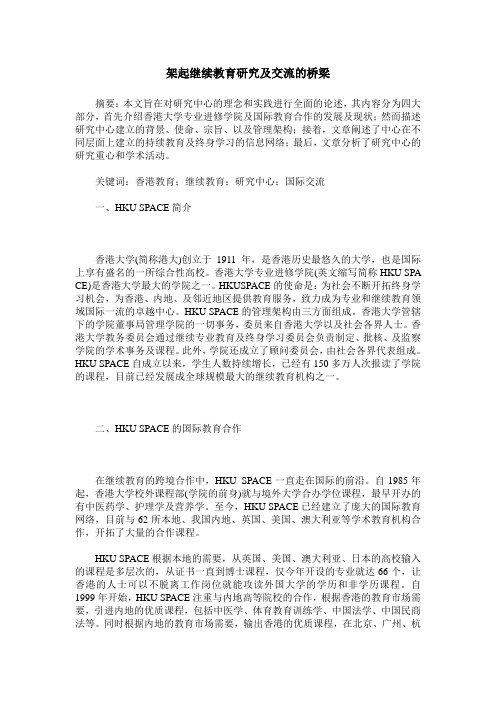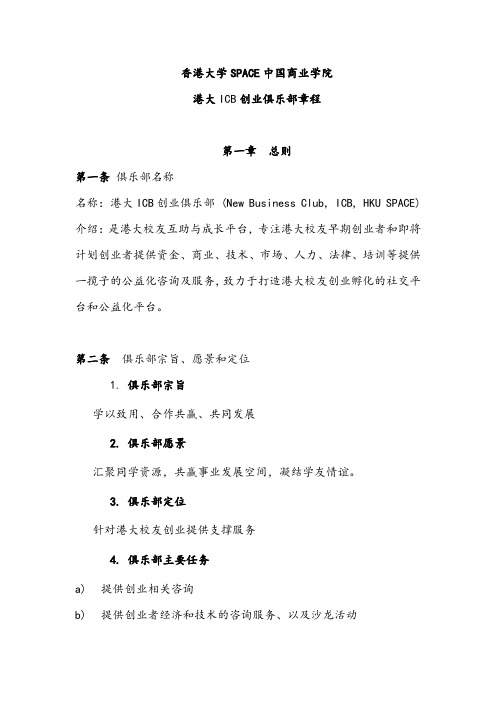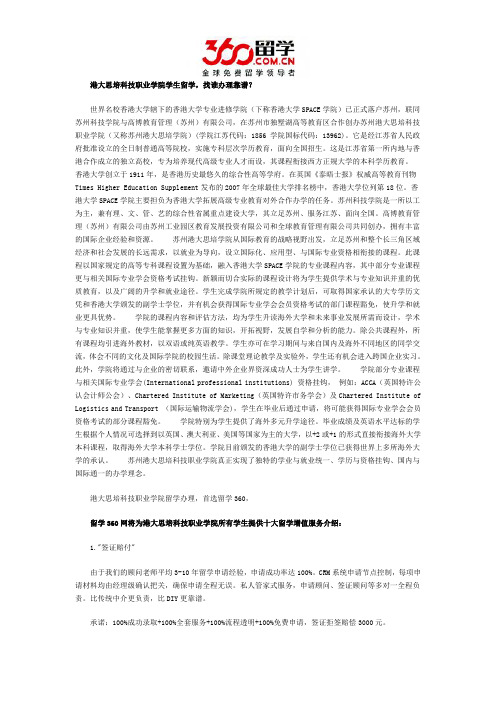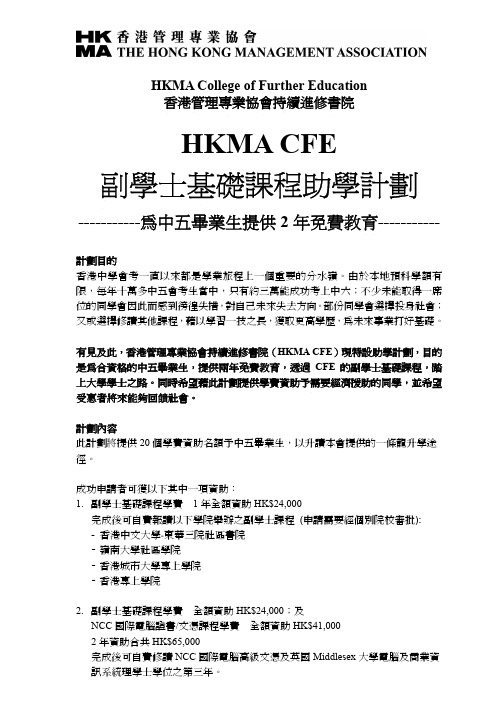HKU SPACE Community College 香港大学专业进修附属 …
- 格式:ppt
- 大小:211.00 KB
- 文档页数:28

架起继续教育研究及交流的桥梁摘要:本文旨在对研究中心的理念和实践进行全面的论述,其内容分为四大部分,首先介绍香港大学专业进修学院及国际教育合作的发展及现状;然而描述研究中心建立的背景、使命、宗旨、以及管理架构;接着,文章阐述了中心在不同层面上建立的持续教育及终身学习的信息网络;最后,文章分析了研究中心的研究重心和学术活动。
关键词:香港教育;继续教育;研究中心;国际交流一、HKU SPACE简介香港大学(简称港大)创立于1911年,是香港历史最悠久的大学,也是国际上享有盛名的一所综合性高校。
香港大学专业进修学院(英文缩写简称HKU SPA CE)是香港大学最大的学院之一。
HKUSPACE的使命是:为社会不断开拓终身学习机会,为香港、内地、及邻近地区提供教育服务,致力成为专业和继续教育领域国际一流的卓越中心。
HKU SPACE的管理架构由三方面组成。
香港大学管辖下的学院董事局管理学院的一切事务,委员来自香港大学以及社会各界人士。
香港大学教务委员会通过继续专业教育及终身学习委员会负责制定、批核、及监察学院的学术事务及课程。
此外,学院还成立了顾问委员会,由社会各界代表组成。
HKU SPACE自成立以来,学生人数持续增长,已经有150多万人次报读了学院的课程,目前已经发展成全球规模最大的继续教育机构之一。
二、HKU SPACE的国际教育合作在继续教育的跨境合作中,HKU SPACE一直走在国际的前沿。
自1985年起,香港大学校外课程部(学院的前身)就与境外大学合办学位课程,最早开办的有中医药学、护理学及营养学。
至今,HKU SPACE已经建立了庞大的国际教育网络,目前与62所本地、我国内地、英国、美国、澳大利亚等学术教育机构合作,开拓了大量的合作课程。
HKU SPACE根据本地的需要,从英国、美国、澳大利亚、日本的高校输入的课程是多层次的,从证书一直到博士课程,仅今年开设的专业就达66个,让香港的人士可以不脱离工作岗位就能攻读外国大学的学历和非学历课程。

香港大学SPACE中国商业学院港大ICB创业俱乐部章程第一章总则第一条俱乐部名称名称:港大ICB创业俱乐部 (New Business Club, ICB, HKU SPACE) 介绍:是港大校友互助与成长平台,专注港大校友早期创业者和即将计划创业者提供资金、商业、技术、市场、人力、法律、培训等提供一揽子的公益化咨询及服务,致力于打造港大校友创业孵化的社交平台和公益化平台。
第二条俱乐部宗旨、愿景和定位1.俱乐部宗旨学以致用、合作共赢、共同发展2.俱乐部愿景汇聚同学资源,共赢事业发展空间,凝结学友情谊。
3.俱乐部定位针对港大校友创业提供支撑服务4.俱乐部主要任务a)提供创业相关咨询b)提供创业者经济和技术的咨询服务、以及沙龙活动c)提供高端私董事脑库服务d)向创业对象提供投资服务咨询e)提供港大校友创业者寻找合伙人的撮合服务第三条俱乐部成员构成香港大学SPACE中国商业学院在读和毕业学员。
第二章活动内容第四条本俱乐部主要活动内容,包括但不限于a)邀请香港大学SPACE中国商业学院学员将工作和学习心得发布于微信群。
b)每年底召开会员年会,年会主要活动如下:i.邀请校友、专家介绍当前专业发展前沿课题、热点。
ii.请年度事业、学业发展良好的会员演讲。
iii.总结俱乐部一年运营工作,规划下一年工作。
c)组织参访优秀企业、学校和研究单位。
d)组织会员与其他机构进行联谊活动。
e)聘请专业人士演讲当前热点问题、学员普遍关注问题。
f)举办各种议题的沙龙。
第三章职能组织及制度第五条俱乐部发起人发起人:纪劲毅、袁强联席发起人: 常昭伟、董金国、殷苗青、黄莉斐第六条执委会组织架构架构说明(具体俱乐部组织人员架构及成员介绍请参阅附件):俱乐部执委会:俱乐部最高权力机构俱乐部主席及副主席:负责俱乐部战略发展以及协调组织各方资源完成发展目标俱乐部秘书长:协助主席进行俱乐部日常管理会员组织部:会员招募、档案管理、会员管理综合管理部:行政管理、后勤管理运营管理部:发展规划、发展计划制定、各部门督导和支撑、公关关系、考核管理财务管理部、财务管理、经费筹集项目拓展与合作部:活动规划、合作拓展、项目实施、对外宣传第七条会议制度1、每年召开一次会员大会:各职能部门年度工作述职;两年一次的民主选举。

港大思培科技职业学院学生留学,找谁办理靠谱?世界名校香港大学辖下的香港大学专业进修学院(下称香港大学SPACE学院)已正式落户苏州,联同苏州科技学院与高博教育管理(苏州)有限公司,在苏州市独墅湖高等教育区合作创办苏州港大思培科技职业学院(又称苏州港大思培学院)(学院江苏代码:1856 学院国标代码:13962)。
它是经江苏省人民政府批准设立的全日制普通高等院校,实施专科层次学历教育,面向全国招生。
这是江苏省第一所内地与香港合作成立的独立高校,专为培养现代高级专业人才而设,其课程衔接西方正规大学的本科学历教育。
香港大学创立于1911年,是香港历史最悠久的综合性高等学府。
在英国《泰晤士报》权威高等教育刊物Times Higher Education Supplement发布的2007年全球最佳大学排名榜中,香港大学位列第18位。
香港大学SPACE学院主要担负为香港大学拓展高级专业教育对外合作办学的任务。
苏州科技学院是一所以工为主,兼有理、文、管、艺的综合性省属重点建设大学,其立足苏州、服务江苏、面向全国。
高博教育管理(苏州)有限公司由苏州工业园区教育发展投资有限公司和全球教育管理有限公司共同创办,拥有丰富的国际企业经验和资源。
苏州港大思培学院从国际教育的战略视野出发,立足苏州和整个长三角区域经济和社会发展的长远需求,以就业为导向,设立国际化、应用型、与国际专业资格相衔接的课程。
此课程以国家规定的高等专科课程设置为基础,融入香港大学SPACE学院的专业课程内容,其中部分专业课程更与相关国际专业学会资格考试挂钩。
新颖而切合实际的课程设计将为学生提供学术与专业知识并重的优质教育,以及广阔的升学和就业途径。
学生完成学院所规定的教学计划后,可取得国家承认的大专学历文凭和香港大学颁发的副学士学位,并有机会获得国际专业学会会员资格考试的部门课程豁免,使升学和就业更具优势。
学院的课程内容和评估方法,均为学生升读海外大学和未来事业发展所需而设计,学术与专业知识并重,使学生能掌握更多方面的知识,开拓视野,发展自学和分析的能力。

T ips for C hoosing your MajorTABLE OF CONTENT2 3 3 3 4 5 5 8 8 8 9 9 9 10 12 13 15IntroductionMaking a Major Decision A. Get to Know Yourself B. Identify a Similar Profile C.How About These StrategiesAre You Qualified to Take this Major or Minor?Do You Need to Do a Minor or a Second Major?Resources for Advice and Support A. Handbook for BSc Students B. BSc Courses C.Online Course Selection System D. CEDARSE Academic Advisers F. Course Selection Advisers G. Induction DayHow to Formulate Your Study Plan? A Step-by-Step ApproachFAQs on Major-Minor SelectionAcademic Advising and Contact InformationI ntroductionCongratulations! Welcome to the HKU Science Faculty.You must be fascinated by the enormous choice of majors and courses available to you. Indeed, the University is the place for you to expand your horizon, to attempt new endeavours, and to acquire new experiences.How should you get the most out of your University education?The HKU BSc programme is rich, diverse, flexible, and challenging. You may choose among the list of Science majors leading to the Bachelor of Science degree and declare it before the start of your second year of study. For those of you who have already identified a strong interest in a particular discipline and wish to specialize early, the curriculum enables you to pursue your subject of interest in a rigorous manner. Those of you wishing to explore multiple interests may take courses in different disciplines or even consider pursuing a minor or even a second major. If you are not sure which major will suit you best, you can explore different possibilities in the first year before committing to a particular major. The programme even provides bridging courses in certain majors for those of you without the proper prerequisites for those majors. In all cases, you do not need to commit to a major before the end of Year 1, and you may choose to use this year to explore and find out your real interest, ability, and career aspiration.Choosing a suitable major is important and may not be an easy decision. This booklet provides you with some guidance and describes some of the resources available. The Academic Advisers/Course Selection Advisers will also assist you to plan your study to ensure a most meaningful and enjoyable learning experience at HKU.M aking a Major DecisionA. Get to Know YourselfIn the BSc programme, you may choose to concentrate on a single primary Science major, or to do a major and minor(s) or even a second major. Before you commit to a certain plan of study, you should first do a rigorous self-assessment of your true interest, ability, and aspiration. You should ask yourself the following questions:- What do I want to achieve for my university study?- What subject(s) am I truly and most interested in?- How good am I in terms of academic, communication, and critical thinking abilities?- How much time and effort am I willing to devote to studying?- What do I want to do after graduation?No one single answer to any of the questions above alone should dictate the choice of your study plan. Instead, you should make a balanced consideration between interest, ability, and career aspiration when you decide which major to pursue.B. Identify a Similar ProfileWhile the followings are by no means all the possible scenarios, you may want to see which of the following situations is most similar to yours:Scenario 1:I am keenly interested in this one Science subject and none others. I want to learn as much about this subject as possible. I am sure this is what I would like to do for my career. If possible, I would like to pursue further studies in this subject.Scenario 2:I am interested in this Science subject. I also believe my studies should be diversified and I should learn more across different disciplines because many fields in Science are interdisciplinary in nature now.Scenario 3:I have a strong interest in this one Science subject, but have not had the opportunity to study it before for some reasons. I believe nevertheless I have the motivation and ability to handle this subject.Scenario 4:Honestly I do not have a clear idea what I should do at this moment. I have an interest in a particular subject, perhaps because I have achieved a good grade in it before, but I am not sure if this is something I should pursue as my major.C. How About These Strategies?We do not believe there is one single strategy for each scenario. Your interest and your situations may also change during the course of study. However, if you can identify with one of the scenarios closely, these are some suggested strategies.Scenario 1: In addition to following the recommended major courses of that subject, you should consider using Faculty Electives as the starting point to explore different disciplines. You may find these courses surprisingly rewarding!Scenario 2: In addition to following the recommended courses of that major, you should try to take as many elective courses in other disciplines as possible. Whether to do a minor or a second major depends on your ability, and the amount of time and effort you are willing to devote to studying.Scenario 3: By all means, give yourself a chance! You can take the bridging courses required and see whether you can handle the subject matter before you consider taking it as major or minor. We suggest you should take some courses in another Science major discipline as a fall back.Scenario 4: You can first list 2 to 3 majors that interest you the most and that you believe you can handle. After you have taken a few courses in each of these majors, if timetable allows, it should become clear to you which one suits you the most.It is perfectly alright not being able to decide on your major of study right away. There could be factors you have not fully considered when you design your study plan while you first entered into theUniversity. Academic Advisers/Course SelectionAdvisers in the Faculty and Counsellors inCEDARS are resourceful professionals who areenthusiastic to assist you individually in makingsuch decisions.A re You Qualified to Take this Major or Minor?Can you select this major or minor if you have not taken the related A-level subjects?Students can usually satisfy the minimum entry requirements, if applicable, for each major and minor either by obtaining passes in the A-level or AS-level subjects as required, or by obtaining passes in the introductory level bridging courses as prescribed. Please consult Course Selection Advisers for advices that will better suit your individual background.How is this related to the Faculty Electives?You are required to take and pass at least 6 credits in each of the 3 blocks of Faculty Electives for graduation. Faculty Electives are courses offered as required introductory courses in the major or minor curriculum, or courses specially designed to broaden the students’ interest in Science, or fundamental courses bridging students to the equivalent standard of HKALE. You may consider taking advantage of these courses as starting points to explore different areas of interest. You may also be able to use these Faculty Electives to satisfy your major or minor curriculum at the end.D o You Need to Do a Minor or a Second Major?Some myths and misconceptionsMyth: I must do a minor if I go by the minimum requirements in my major.Reality: It is perfectly alright to do the minimum requirements in a major without a minor. A single major without a minor is not a less respectable degree than any major-minor combination.Myth: I must do a minor or a second major to demonstrate a broadened background.Reality: You can achieve an equally broad academic training without doing a minor. In fact, an academic record showing a wide range of elective courses from various disciplines may provide you with the background training to understand and discuss issues intelligently in different subjects, and the ability to connect knowledge and concepts across disciplines.Why choose a minor?A minor is a structured academic programme for those students pursuing the subject as a second interest. Here are some of the reasons for doing a minor.∙You have more than a casual interest in an elective subject.∙You would like to be recognized to have achieved a certain extent of knowledge in the elective subject.∙The minor can enhance your study major and improve your opportunities for further studies or career.In most cases, you can enroll in the same courses listed in the curriculum without formally registering for minor in that subject. Deciding to do a minor in a certain subject may actually reduce your flexibility to take other elective courses because of the core requirements and possible timetable clashes.What about a second major?A double major in two different subjects bears testimony to the student’s academic ability and may enable the student to seek career in either area. Here are some of the reasons for doing a second major.∙You have a strong interest in two different subjects.∙You have confidence in your ability to study two subjects at the same time.∙You are committed to devote much time and effort on study.∙You believe the dual major can enhance your opportunities for further studies or career.Before committing to do a minor or a second major, you should ask yourself the following questions:∙Do I have the background and ability to complete the additional course requirements?∙Can I afford the time and effort?∙Would the minor or second major enhance my academic training and career prospect?∙Does the minor or second major agree with what I want to achieve for my university learning?∙Would doing a minor or a second major actually hamper my intention to broaden my horizon in even more disciplines?∙Are there other endeavours I would rather devote my time?R esources for Advice and SupportWeb-based Information System & HandbooksA. Handbook for BSc StudentsB. BSc CoursesC. Student Information SystemAdvising in PersonD. CEDARSAdvisersE. AcademicF. Course Selection Advisers (CSAs)Special EventDayG. InductionA. Handbook for BSc Students(http://www.scifac.hku.hk/ug/current/bsc/curriculum/advising/handbook)A comprehensive description of the major/minor curriculum requirements,degree regulations, graduation requirements, course selection procedures, examinations and honours classification, major events, and calendar.B. BSc courses(http://web.science.hku.hk:8080/sr/servlet/enquiry)✓Description of Science majors and minors offered to BSc students.✓Descriptions of courses in Science majors and minors and Science Common Core courses.✓The Regulations for the Bachelor of Science Degree.C. Student Information SystemYou do not need to declare your major inthe first year. You have to declare yourprimary science major during the courseselection period (August) before the startof your second year of study.Declaration of major-minor is madethrough the Student Information System (SIS).D. CEDARS(http://cedars.hku.hk)The University’s Centre of Development and Resources for Students (CEDARS) provides students with a variety of resources and services on personal and career development. You may seek professional advices on career guidance and professional preparation from their Careers Counsellors. CEDARS keeps students updated on career information, summer internship, and part-time opportunities and organizes workshops and career talks to help students prepare themselves for their career challenges. Visit the CEDARS’s homepage for tips on career planning and preparation for your interested career.E. Academic AdvisersTo assist students with the smooth transition from secondary to university education and help students set their academic and personal goals, each first year student from 2011-12 would be assigned an Academic Adviser to enrich their total learning experience.when you encounterare teachersDepartment of Biochemistry from which courses of the 15 Science majors are offered. For each major, there are a number of CSAs who can discuss with students about their choice of courses during the course selection period and the course add/drop period. You may also seek their expert advices on choosing your majors and minors. Refer to the Handbook for BSc Students for the list of CSAs.Apart from seeking advices:✓You must meet your Academic Adviser to seek signature of the courses you have selected by printing the “My Course History” from the StudentInformation System (SIS) after finishing online course selection duringthe course add/drop period in the first two weeks of the first semester(mandatory for all BSc I students);You must meet the Course Selection Adviser for the following matters: ✓Seek signature of the Course Approval Form when you do not meet the prerequisite requirement of courses or if you have timetable clashes;✓Seek suggestions of replacement courses if a particular course appears in the curriculum of both your double-major or major-minor combination;✓Seek approval for taking course load deviating from normal course load if you wish to take fewer than 24 or more than 36 credits in thefirst/second semester or more than 72 credits in an academic year (forBSc II or above students only).G. Induction DayAn Induction Day is organized by the Faculty tointroduce to you the BSc degree structure, servicesprovided by the Faculty and HKU in assisting you toformulate your study plan. The Induction Day iscompulsory for BSc I students which will be held inAugust during the time you have to select your courses. In addition to an Induction Seminar, the Induction Day includes activities such as small group discussion with science teachers, talks on Science majors and minors, course and major selection, advising system, graduation requirement and Faculty regulations. Teachers and students will also be available in the information booths for each Science major and minor to answer your questions. All firstyear students should not miss such a valuable chance for getting information on the different majors!For BSc II or above students, a Consultation Session is also held in August where CSAs are available to advise you on selection of courses.H ow to Formulate Your Study Plan? A Step-by-Step ApproachFollow the step-by-step guide below to formulate your study plan in your first year.Self-explorationTry to understand yourself more, and be honest to your interest. Match your interest with your ability and personality, and take a balance between them. Identify the expected outcome and targets you would like to achieve with your degree.Step 2students in the interested majors.Integrate InformationExecuting Your Planyear.plan after talking to the Adviser.F AQs on Major-Minor Selection1. When do I need to declare major?You do not need to declare your major in your first year. You have to declare your major during the course selection period (August) before the start of your second year of study. You can change your declared major / minor as long as the course selection system is opened in each semester, throughout your stay at the University before you graduate.2. Can I change my major later?Yes, but you should consider whether:a. you are capable of studying a major that is totally new to you;b. you have fulfilled the prerequisites of that major and you may have toextend your study;c. the courses you have successfully completed can be used towards thenew major;d. you are indeed going to commit to the major that you will switch to.3. Would all the credits that I previously took for a particular major be wastedand would I need to start from scratch again if I switch to another major?A major requires at least 72 credits of courses. If you switch major, you may haveto start with the introductory courses in the major. You should consider carefully whether you can finish your degree on time. The credits that you have already earned can generally be counted as electives. In all cases, you should consider to consult a Course Selection Adviser if you plan to change your major very late in the course of your University study.4. If I have declared a 2nd major or a minor, but I cannot go on to complete the2nd major or the minor, what should I do?If you cannot complete the 2nd major or the minor, it would not be shown on the transcript. Nonetheless, you are always encouraged to approach the Faculty Office or a Course Selection Adviser if you have any questions.5. Do I need to fulfill any requirements to declare a 2nd major or a minor?Some non-Science faculties may set a minimum requirement for their majors and minors offered. Please check details from the relevant faculties.6. Who can I ask for advice about major and course selection?There are Course Selection Advisers (CSAs) for each major who can answer questions related to the particular Science major(s) and individual courses. If you have not made up your mind, you may seek advice from multiple CSAs of your interested majors. You can also visit our Advisers in the Faculty of Science Office.7. Can I use my course to satisfy the requirement of 2 different majors (or therequirement of a major and a minor) if such a course appears in the syllabus of both?Whenever the same course appears in the curriculum of one or more majors (or minors), it can only be used for satisfying the curriculum requirement of one major or minor. Students need to approach Course Selection Advisers for suggestions of replacement courses in order to complete the curriculum requirement of the selected options.8. Is there any activity by the Faculty to introduce information about major andcourse selection?An Induction Day will be held in August for all first year BSc students. A general talk would also be held to provide students an overview of the BSc curriculum and on course selection. Teachers and existing students will also be available in the information booths for each Science major and minor to answer your questions.A cademic Advising and Contact InformationThe Faculty of Science believes that academic advising is a key component of student learning in the University, particularly in light of the increased flexibility in the curriculum structure and in the number of major options available. An academic advisory system has been set up to offer advices to students based on their individual needs.Faculty Academic Advising:The Faculty of Science Office is responsible for providing general guidance and support, in particular to students who have troubles on identifying their major of study.Prof W K Chan (Associate Dean) Faculty of Science Office, G12, G/F., Chong Yuet Ming Physics Building Tel: 2859 2683Email: waichan@hku.hkMs June Tse (Student Advisor) Faculty of Science Office, G12, G/F., Chong Yuet Ming Physics Building Tel: 2859 2683Email: junetse@hku.hkAcademic Advisers:They are responsible for assisting freshmen with the smooth transition from secondary to university education, and help them set their academic and personal goals. A list of Academic Advisers can be found in the Handbook for BSc students.Course Selection Advisers:They are responsible for providing academic advising for each individual major. A list of Course Selection Advisers can be found in the Handbook for BSc Students.School / Departmental contacts:School / Departments Location, Telephone and WebsiteSchool of Biological Sciences 6/F, The Kadoorie Biological Sciences BuildingTel: 2299 0800 Web: www.hku.hk/biosch/Biochemistry 3/F, Laboratory Block, LKS Faculty of Medicine Building 21 Sassoon Road, Pokfulam Road, Hong KongTel: 2819 9240 Web: www.hku.hk/biochemChemistry G/F, Chong Yuet Ming Chemistry BuildingTel: 2859 7919 / 2241 5131 Web: chem.hku.hkEarth Sciences Room 309, James Lee BuildingTel: 2859 1084 / 2857 8558 Web: www3.hku.hk/earthsciMathematics Room 408, Run Run Shaw BuildingTel: 2859 2250 Web: www.hku.hk/mathPhysics Room 518, Chong Yuet Ming Physics BuildingTel: 2859 2360 Web: www.physics.hku.hkStatistics and Actuarial Science Room 502, Meng Wah ComplexTel: 2859 2466 Web: www3.hku.hk/statisticsFACULTY OF SCIENCE – THE UNIVERSITY OF HONG KONG G12 Chong Yuet Ming Physics BuildingPokfulam Road, Hong KongTel:(852) 2859 2683 Fax: (852) 2858 4620Email:science@hku.hkWebsite:www.scifac.hku.hk/。


中文名:香港大学外文名:The University of Hong Kong简称:港大(HKU)校训:明德格物创办时间:1911年类别:港府资助学校类型:综合主管部门:香港特别行政区现任校长:徐立之知名校友:孙中山张爱玲朱光潜何鸿燊所属地区:中国香港主要院系:建筑学院文学院经济及工商管理学院牙医学院院士:12人香港大学,简称港大(英语:The University of Hong Kong,HKU),是一所于1910年于香港岛成立的大学,其前身为香港西医书院,是香港历史最悠久的大学。
港大中文校训为“明德格物”,而拉丁文对应的校训则为Sapientia Et Virtus。
大学以英语作为教学语言。
自2007年开始,港大被英国THES-QS持续评为全球前30名的顶尖大学,位列中华人民共和国第一。
世界排名香港大学是香港其中一所学术排名最高的大学。
根据《亚洲周刊》,香港大学在2000年于亚洲最佳大学的排名中位列第三。
于亚洲周刊2000年亚洲最佳大学调查中香港大学商学院的工商管理硕士课程(MBA)于香港中文大学之后位列第二。
香港大学于《英国泰晤士报》(Times Higher Education Supplement,「泰晤士报高等教育特刊」)2007年的大学排名中位列全球第十八位。
在2008年10月8日公布的最新《〈泰晤士报〉高等教育——二零零八全球顶尖大学排行榜》中,香港大学由去年的第十八名,跌到第二十六名。
在《泰晤士报》(Times Higher Education Supplement,「泰晤士报高等教育特刊」)2009年的大学排名中,香港大学位列全球第二十四位。
在2010年5月12日公布的QS亚洲大学排名中,香港大学继续蝉联榜首。
在2010年美国新闻周刊的亚洲大学排名中,香港大学蝉联榜首。
在《泰晤士报》2010年的大学排名中,香港大学位列全球第二十三位,超日本东京大学,居亚洲第一位。
在国际高等教育研究机构Quacquarelli Symonds(QS)最新公布的亚洲大学排名榜中,港校名列前茅,香港大学、科技大学、中文大学再次晋身5强,位列亚洲区第1、第2及第4位,力压日本、韩国、新加坡一众名牌大学,可见港校质素广受认同。
香港大学留学怎么样想去香港学习的同学,最关心的就是香港的学校了。
今天小编给大家介绍一下香港大学,一起来看看具体内容吧!学校概况:香港大学(港大)是香港历史最悠久的大学,多年来一直秉承优良传统,提供卓越的师资及世界级的科研发展,致力培育社会领袖人才。
港大前身为创立于一八八七年的香港西医书院,于一九一一年正式成立,孙中山先生曾习医于此。
港大最先成立医学院、工程学院及文学院。
一九一六年十二月港大举行首届毕业礼,有二十三名毕业生及五名名誉毕业生获授学位。
香港大学是香港其中一所学术排名最高的大学。
地理位置:香港大学校园本部座落香港岛西部的薄扶林道以东、般咸道以南、罗便臣道以西、龙虎山以北,佔地约16公顷。
医学院现时位于香港玛丽医院对面的沙宣道罗富国教育学院原址。
牙医学院及教育学院言语及听觉科学学部位于西营盘的菲腊牙科医院内。
另有位于新界的嘉道理农业研究所及香港石澳鹤咀的太古海洋科学研究所。
专业设置:建筑学院建筑系房地产及建设系城市规划及设计系文学院中文学院中文系本部跨文化研究系语言与沟通系人文学院比较文学系艺术史系历史系语言学系音乐系现代语言及文化学院哲学系日本研究系美国研究系欧洲研究系语文研习所法语系德语系西班牙语系意大利语系葡萄牙语系泰语系经济及工商管理学院商学院经济及金融学院教育学院资讯科技学部语言及文学学部学习、发展及多样性学部土木工程系计算机科学系工业及制造系统工程系机械工程系电机电子工程系法学院法学系比较及公共法中心法律专业学系李嘉诚医学院外科学系临床试验中心麻醉学系解剖学系生物化学系临床肿瘤系社区医学系理学院化学系本科申请要求:1.应届内地高中毕业生均可申请。
2.高考成绩是考虑条件之一,港大将参考其所属省市高考第一批本科(重点高校)的分数线。
3.申请人须参加由港大安排的英语水平测试,同时亦有机会被邀请进行面试,笔试成绩及面试表现亦在考虑范围之内。
研究生申请要求:申请人须参加由港大安排的英语水平测试,同时亦有机会被邀请进行面试,笔试成绩及面试表现亦在考虑范围之内。
香港考试制度介绍如下:
香港作为中国的一个特别行政区,拥有自己独立的教育制度和考试制度。
本文将介绍香港的考试制度,包括香港中学文凭考试、香港高级程度会考、香港大学文凭考试等。
1.香港中学文凭考试(HKDSE)
香港中学文凭考试(HKDSE)是香港中六学生通过的高中文凭考试,相当于中国大陆的高考。
它以多个科目的成绩作为评判方式,包括语文、数学、英语、物理、化学、生物、历史和地理等多个科目。
考试形式包括笔试和实验,考生需要在两年内完成相关课程的学习和考试。
2.香港高级程度会考(HKALE)
香港高级程度会考(HKALE)是一种高级水平的考试,主要面向香港中六学生,考试内容包括文科、理科、商科、艺术等。
该考试的主要目的是为了帮助学生进入香港大学,也同时适用于那些希望在香港或海外获得高水平教育的学生。
考试形式主要包括笔试和口试。
3.香港大学文凭考试(HKU SPACE)
香港大学文凭考试(HKU SPACE)是一个针对成年人和非大学生的学士文凭考试,通过该考试可以获得与中国以外的大学同等的学位。
该考试分为两个部分,分别是国际通用考试(Common Examinations)和专业考试(Professional Examinations)。
考试科目涵盖了商业、法律、教育、医学、科技和艺术等多个领域。
总体来说,香港的考试制度是比较完善和严格的,以高度的自律性和规范性为特点。
香港的考试体系注重考查学生的思维和应用能力,兼顾标准化和灵活性,同时强调创新和挑战。
考生应针对不同的考试科目,学习和掌握不同的知识和技能,以期取得好的成绩。